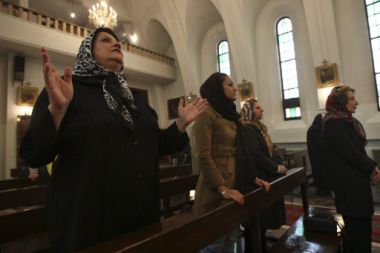Iranian Christian flogged after drinking Communion wine

An Iranian Christian was flogged on Wednesday, according to rights groups, after a court in Rasht, Iran sentenced him and three other Christians to 80 lashes for drinking wine as part of a Holy Communion service.
According to the Middle East Correspondent for Morning Star News, Behzad Taalipasand, a convert from Islam, received the 80 lashes after being arrested on December 31, 2012 and sentenced this month for drinking alcohol, quoting two sources -- Middle East Concern (MEC) and Christian Solidarity Worldwide (CSW).
"Drinking alcohol is not illegal for Christians, but as Shiah Islam is the state religion, it is prohibited for Muslims; the conviction and sentencing thus reflects the state view that a Muslim cannot change his/her religion," said the story.
"Another convert from Islam was thought to have been whipped, but there were conflicting reports as to whether it was Mehdi Dadkah - also known as Danial - or Mehdi Reza Omidi, also known as Youhan."
A CSW representative said that Taalipasand and the other Christian in question were flogged with "extreme violence." Nina Shea, director of the Center for Religious Freedom at the Hudson Institute, told Morning Star News the flogging was unjust and inhumane.
"It's horrifying," Shea said. "It drains the regime of its legitimacy because of its cruelty. Because it is cruel and unusual punishment."
Taalipasand, Omidi, Dadkah and Amir Hatemi (also known as Youhanna) all received notice on Oct. 20 that they had been convicted of drinking alcohol and owning a satellite antenna and would receive 80 lashes. The four Christians filed an appeal of the sentence but found out the same day that the punishment was to be carried out, as the appeal had been denied or not received.
All four converts from Islam were arrested during state crackdowns on house churches. Although the exact dates of Dadkah' and Hatemi's arrest remain unclear, Taalipasand and Omidi were arrested Dec. 31, 2012 but were later released on bail on Jan. 16. Taalipasand was tried once before in 2011 on similar charges but was acquitted. It was not known when or even if the sentences for the other two Christians will be carried out.
A CSW representative called the sentence "appalling".
"The sentence is unjust, and they are being punished for simply partaking in a sacrament practiced for centuries by Christians the world over," said CSW Press Officer Kiri Kankhwende. "It is an infringement on their right to manifest one's faith in practice, worship and observance, as guaranteed under the International Covenant on Civil and Political Rights [ICCPR], to which Iran is signatory."
The Morning Star News went on to say that in the latest of a series of harsh court decisions, an appeals court in Shiraz on October 12, upheld prison sentences against four alleged members of the Iranian house church movement.
Mojtaba Hossein, Mohammad-Reza Partoei (also known as Korosh), Vahid Hakkani and Homayoun Shokouhi were sentenced on charges of attending a house church, spreading Christianity, having contact with foreign ministries, propaganda against the regime and disrupting national security, according to MEC. The court upheld the sentence of three years and eight months in prison for each.
Additionally, Shokouhi's wife and son, who were found guilty on similar charges, were each given a two-year prison sentence, but the sentences were suspended.
"The group was arrested in Shiraz in February 2012 during an official crackdown on house churches. They were found guilty of the charges on June 10, 2012, but appealed their case. The October 12 appeals court ruling cannot be further appealed," said the story.
This month, the location of two Christians who were picked up by Iranian security officials and then essentially disappeared became known.
Officials arrested Ebrahim Firouzi, a convert from Islam, and Sevada Aghasar, an Iranian-Armenian Christian, at a friend's office in Karaj on August 21 and took the two to Evin Prison. Eventually it surfaced that the two were being held in isolation in the prison.
According to Mohabat News, officials accused Firouzi of spying for the Israelis. Officials had searched Firouzi's house several times and confiscated many of his belongings, including his computer. They pushed him to reveal what support, if any, he received from foreign Christian groups that allowed him to buy a laptop and help another Christian prisoner.
As with Firouzi, Aghasar's location after his arrest was unknown for weeks. Eventually he was allowed a short call to his family and a brief, no-contact visit with them in September. As with Firouzi, he is being held in Evin prison, according to Mohabat News. Iranian judicial authorities have not yet officially announced any charges against the two.
The arrests match a larger pattern of persecution of religious minorities that started in 2011, according to Kankhwende.
"The most worrying aspects of this campaign of repression," she said, "include waves of arrests and detentions, regular raids on church gatherings, harsh interrogations, physical and psychological torture - including demands for recantations of faith and for information on the identities of fellow Christians - extended detentions without charge, violations of due process, convictions for ill-defined crimes or on falsified political charges and economic targeting through exorbitant bail demands."
Earlier this year, the US Commission on International Religious Freedom recommended that Iran be designated as a Country of Particular Concern for its "systematic, ongoing, and egregious violations of religious freedom, including prolonged detention, torture, and executions based primarily or entirely upon the religion of the accused."
Iran is nearly 99 per cent Muslim, according to Operation World. Christianity is recognized as a historic religion, but courts can impose the death sentence on Muslim men who leave Islam, and life in prison for women apostates.











